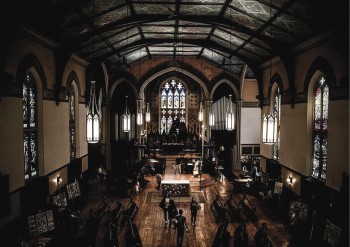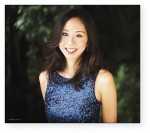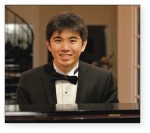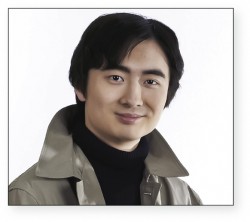 Eminent pianist, writer and pedagogue William Aide is the curator of “Piano Bravura: The New Generation,” a piano series beginning March 9 at the historic Church of the Holy Trinity.
Eminent pianist, writer and pedagogue William Aide is the curator of “Piano Bravura: The New Generation,” a piano series beginning March 9 at the historic Church of the Holy Trinity.
“Last February,” Aide told me via email, “our music director Ian Grundy, Reverend Sherman Hesselgrave and I were on the hunt for a new piano for Holy Trinity, and we had already auditioned several Steinway and Baldwin instruments. All three of us play, but it was up to me to test the resources of prospective instruments with concert repertoire.” Steinway Piano Gallery’s Alex Thomson led them to a private home in Oakville where Aide tested the piano for its tonal range, colours, beauty of sound, pedalling response, and even its rapid repeating-note action, with Mozart, Chopin’s Études and D-flat Nocturne, Ravel’s Alborada del Gracioso and a Debussy prelude. “We all three fell in love with it and through a generous anonymous donation were able to acquire it,” he said. “On April 7, 2016, flutist Robert Aitken and I offered the first concert featuring the piano as an accompanying and solo instrument.”
From there it seemed obvious to Aide that a series of piano recitals would display the new instrument’s fine qualities. Aide’s decades of teaching and adjudicating had kept him in touch with “younger pianistic talent” and Piano Bravura was born. He chose the initial three pianists because “I know them and their playing at close quarters.” Aide also told me that he was pleased with the repertoire the three selected for the series. “[Their] choices cover a wide range of styles and feature some unusual items.”
 Angela Park: “As adjudicator, I first heard Angela Park play the Schumann concerto in a London festival when she was 14. ‘This is the real thing,’ I thought. We worked together for nine years and I was so gratified to help prepare her masters’ graduating recital in 2003, the year of my retirement from U of T’s Faculty of Music. Angela is a much sought-after chamber music player, as the pianist in Ensemble Made in Canada and duo partner of such artists as cellist Rachel Mercer and violinist Jonathan Crow. Her solo playing is outstandingly expressive and her concerto performances second to none. She occasionally still plays for me and we are good friends.”
Angela Park: “As adjudicator, I first heard Angela Park play the Schumann concerto in a London festival when she was 14. ‘This is the real thing,’ I thought. We worked together for nine years and I was so gratified to help prepare her masters’ graduating recital in 2003, the year of my retirement from U of T’s Faculty of Music. Angela is a much sought-after chamber music player, as the pianist in Ensemble Made in Canada and duo partner of such artists as cellist Rachel Mercer and violinist Jonathan Crow. Her solo playing is outstandingly expressive and her concerto performances second to none. She occasionally still plays for me and we are good friends.”
Park’s recital March 9 begins with Mozart’s irresistible Sonata K333 before moving to the impressionistic Images: Book II of Debussy and Liszt’s revolutionary Années de Pèlerinage Book I: Suisse. Aide had no part in choosing the content of the recitals but he told me that he did coach Angela in the Debussy Images II set years ago.
 Tony Yike Yang: As a juror, Aide heard Tony Yike Yang in the last National Chopin Competition which was held in Mississauga several years ago. “I remember fondly that he liked my Chopin Berceuse, an item in a recital the jury members offered during that event,” Aide told me. “We sent Tony to the International Chopin Competition in which his laureate playing was so compelling.” Yang was 16 in 2015 when he became the youngest prizewinner (he finished fifth) in the history of the competition. “I have recently reheard his Chopin E Minor Concerto and B-flat Minor Sonata from that competition on YouTube and was astounded once again by his inspired, world-class playing. By the way, in his emails he confers an honourary doctorate upon me.”
Tony Yike Yang: As a juror, Aide heard Tony Yike Yang in the last National Chopin Competition which was held in Mississauga several years ago. “I remember fondly that he liked my Chopin Berceuse, an item in a recital the jury members offered during that event,” Aide told me. “We sent Tony to the International Chopin Competition in which his laureate playing was so compelling.” Yang was 16 in 2015 when he became the youngest prizewinner (he finished fifth) in the history of the competition. “I have recently reheard his Chopin E Minor Concerto and B-flat Minor Sonata from that competition on YouTube and was astounded once again by his inspired, world-class playing. By the way, in his emails he confers an honourary doctorate upon me.”
Aide asked Yang, now 18, to include that Chopin sonata in his April 2 recital. Mussorgsky’s monumental Pictures at an Exhibition was Yang’s own choice.
 Sheng Cai: “In 2003, I was musical advisor to the Toronto Symphony Orchestra Concerto Competition,” Aide said. “That year the jury chose Sheng Cai to play the Chopin E Minor Concerto. At the reception after his incredibly poetic performance we fell into a lively pianists’ dialogue and we have continued these conversations ever since. Sheng comes over to our house several times a year and brings with him his most recent CD concerto performances. I must be some kind of mentor. At any rate we enjoy swapping CDs and discussing the challenges of forging a career as a concert artist. His exuberance is contagious.”
Sheng Cai: “In 2003, I was musical advisor to the Toronto Symphony Orchestra Concerto Competition,” Aide said. “That year the jury chose Sheng Cai to play the Chopin E Minor Concerto. At the reception after his incredibly poetic performance we fell into a lively pianists’ dialogue and we have continued these conversations ever since. Sheng comes over to our house several times a year and brings with him his most recent CD concerto performances. I must be some kind of mentor. At any rate we enjoy swapping CDs and discussing the challenges of forging a career as a concert artist. His exuberance is contagious.”
Cai’s program comprises two Scarlatti sonatas, Mozart’s Sonata K332, Chopin’s addictive Barcarolle and two pieces “one doesn’t often hear,” according to Aide: Schumann’s Humoresque Op.20 and Villa Lobos’ Rudepoema, written for Arthur Rubinstein.
As for other ideas in the works for additional musical events in the church:
“There was a time, especially under the aegis of CBC producer, Srul Irving Glick, when Holy Trinity was a favoured venue for national broadcasts. Its luminous acoustic and, of course, the new piano suggest future chamber music and voice series as well as a continuation of these superb piano recitals. I know a number of musicians of the next generation who will easily fill the bill. We will keep you posted.”
Paul Ennis is the managing editor of The WholeNote.



